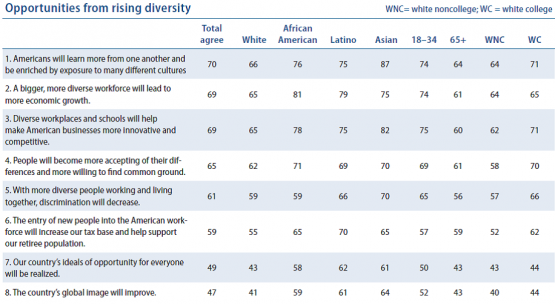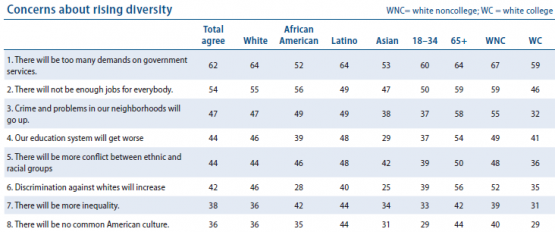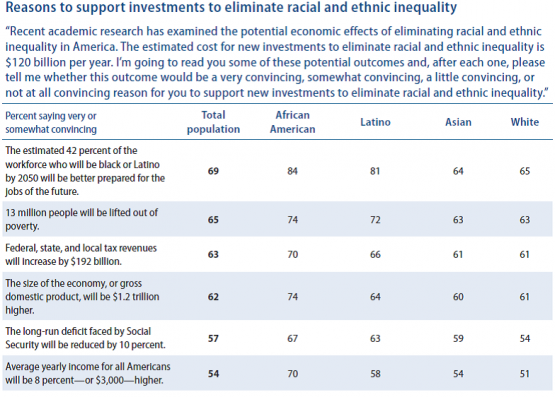As diversity rises, will political divisions start to emerge between minority groups? It’s one theory for how the GOP could survive in tomorrow’s more diverse electorate, but it’s not one that appears to be based in much evidence. Latinos, for example, far from being flustered by the prospect of an African-American president, embraced him overwhelmingly in 2008. That support that only deepened in 2012 when they gave him 71 percent of their votes.
A new poll from CAP and PolicyLink has more bad news for the GOP. Not only has this fragmenting and infighting not erupted in a big way yet, it also appears unlikely to happen in the coming years either. Blacks in particular, far from recoiling from rising diversity that’s displacing them from their position as nation’s largest minority, embrace these changes.
In the poll, respondents were asked whether they agreed or disagreed with 16 statements about rising diversity in America, evenly divided between concerns and opportunities. The level of agreement with each statement was recorded on a 10-point scale, with maximum agreement being 10 and maximum disagreement being zero. From these statements, we created a 160-point index measuring openness to diversity, with zero being the least open to diversity and 160 being the most open to diversity. The overall public received a mean score of 86.5 on our composite openness measure. African Americans received a 93 score, higher than Latinos at 90 and quite a bit higher than whites at 84. Of race-ethnic groups, only Asians had a higher score at 97.
The poll also found that openness to diversity varied by age and education, generally going down with age and up with education. Reflecting these patterns, black Millennial generation college graduates received a very high 105 score on the openness to diversity index. On some of the diversity opportunity statements in the index, this group came close to unanimous agreement (scores 6–10). For example, 94 percent of black Millennial college graduates agreed that “a bigger, more diverse workforce will lead to more economic growth”.
As can be seen from the table below, African Americans generally scored quite high on most of the diversity opportunity statements. On the top four opportunity statements, they averaged an impressive 77 percent agreement. The one notable exception to this pattern of strong support was on the statement “With more diverse people working and living together, discrimination will decrease,” where blacks agreed at a relatively low 59 percent level, no higher than the level among whites:

Turning to the diversity concerns statements, blacks gave majority agreement to only two of eight statements (see table). Some concerns generated notably low levels of agreement. Only 28 percent thought discrimination against whites will increase, 35 percent thought there will be no common American culture and 39 percent thought the education system will get worse. And the concern item that generated the highest level of agreement, that there will not be enough jobs for everyone, still registered only 56 percent support, below (and frequently far below) levels of agreement for all eight diversity opportunity items:

But it is on support for a new equity agenda to address racial and ethnic inequality that African Americans really distinguish themselves. On most questions in the poll that tested support for such an agenda or reasons why we need such an agenda, blacks registered more enthusiasm than any other race-ethnic group.
For example, almost 9 in 10 blacks — 87 percent — supported “new steps to reduce racial and ethnic inequality in America through investments in areas like education, job training, and infrastructure improvement,” compared to the just 12 percent who were opposed. In addition, 72 percent of blacks said such steps would help the economy overall, compared to 6 percent who think they would hurt the economy. In addition, 88 percent of blacks said they would be willing to invest “significantly more public funds to help close [the] gap in college graduation rates” between black and Latino students and white students, compared to 11 percent who said they were not willing to make such investments.
Other results underscore African Americans’ unusually strong commitment to collective action to address equity problems. Respondents in the poll were asked to choose between two competing ideas about America today. One idea put forth a more individualistic narrative of advancement: “Average Americans are on their own. Jobs and benefits are less secure and you can’t really count on anyone but yourself and your family to get ahead.” The second narrative offered a more collective vision of economic mobility: “In today’s economy, we all face common challenges. Jobs and benefits are less secure, so we all need to work together to make it easier for average Americans to get ahead.” The latter collective approach was favored by 69 percent of blacks, compared to just 29 percent who favored the individualist approach. Latinos and Asians also favored the collectivist approach, but by much smaller margins than African-Americans.
Blacks also endorsed the idea that racial and ethnic inequality was holding back economic growth by a wide 65–29 margin, again higher than any other race-ethnic group. Finally, when queried about research-based reasons to support an estimated $120 billion per year in new investments to reduce racial and ethnic inequalities, blacks were more likely than any other race-ethnic group to find these reasons convincing enough to justify such a large investment (see chart). The most convincing reason was “The estimated 42 percent of the workforce who will be black or Latino by 2050 will be better prepared for the jobs of the future”, deemed somewhat or very convincing by 84 percent of blacks:

These attitudes are good news for the country but bad news for a GOP hoping to see infighting in the progressive coalition. African-Americans, as these data make clear, embrace the country’s growing diversity and are exceptionally committed to a new equity agenda to lift up everyone in that coalition.
